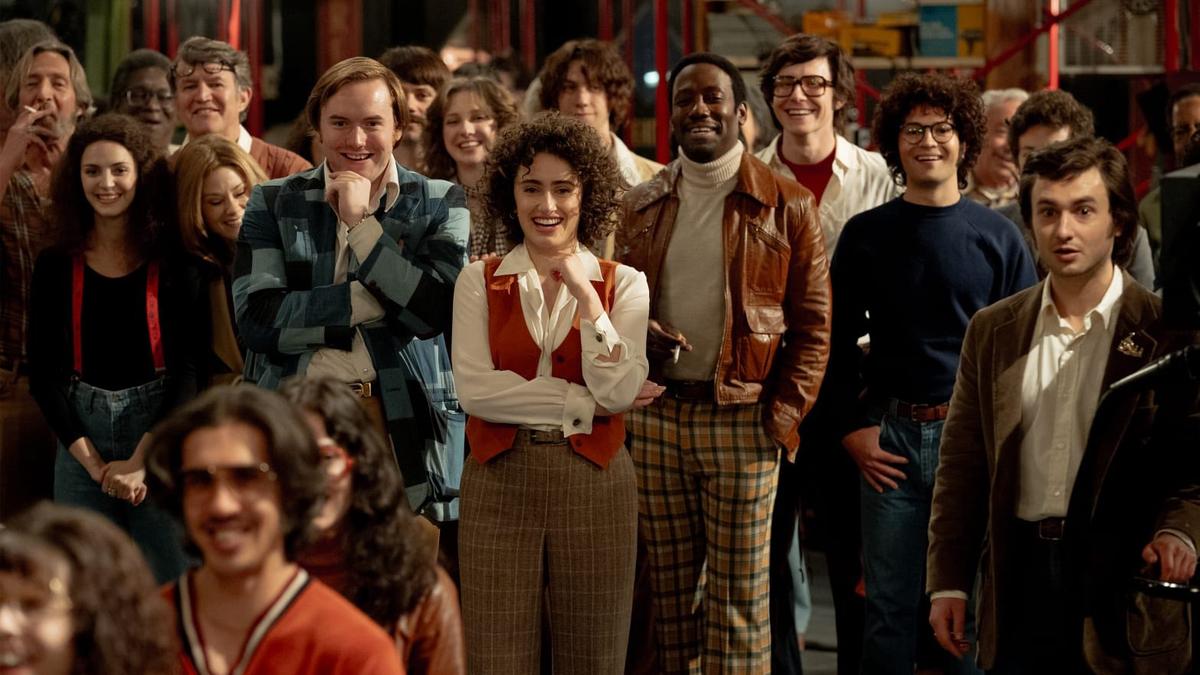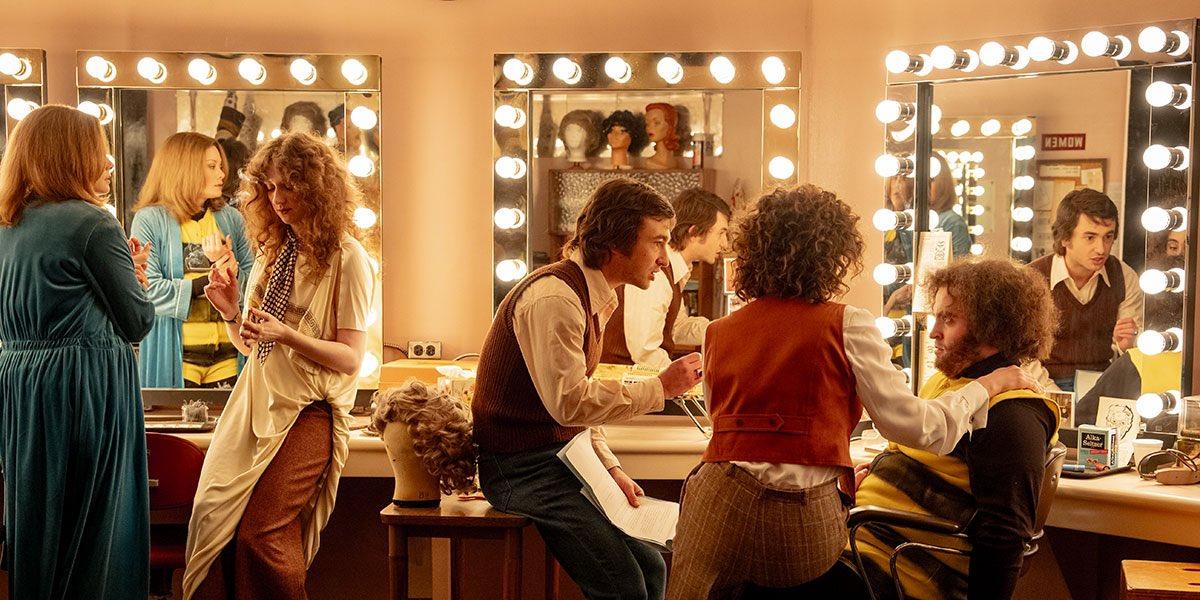‘Saturday Night’ movie review: Jason Reitman’s earnest ode to SNL is brilliantly broken

A still from ‘Saturday Night’
| Photo Credit: Sony Pictures
There’s a llama loose in the hallways of 30 Rockefeller Plaza, a lighting rig threatening to pulverise the cast, and a drug-addled John Belushi wonders if dressing as a bee on live television is the definitive low point of his life. This is the frenzied torrent of Jason Reitman’s Saturday Night, a backstage fever dream chronicling the chaotic ninety minutes before the debut of NBC’s iconic late-night live sketch comedy show on October 11, 1975. It’s a maelstrom of egos, improvisation, and existential dread, all orbiting the deer-in-headlights figure of creator Lorne Michaels, played with delicious anti-charisma by Gabriel LaBelle.

The movie, in essence, is a love letter to creative calamity — the kind that produces either profound brilliance or utter catastrophe, often both. Employing a single-shot conceit (or a convincing illusion thereof), Reitman drags us through the bustling corridors of Studio 8H, past fraying tempers and smouldering anxieties. The camera doesn’t so much observe as hurtle, an omnipresent third wheel in this dysfunctional family reunion of comedic misfits. The effect is disorienting, occasionally exhausting, but undeniably hypnotic.
Reitman’s real-time countdown is as much a filmic exercise in anxiety as it is a study of nascent genius. The pacing evokes a kind of creative purgatory, where every ticking second reminds the cast and crew that their half-formed dream is about to be judged by millions. Ostensibly sky high, the stakes are mostly symbolic — will network executives pull the plug before this comedy experiment even gets its footing? Will Milton Berle, played with cartoonish lechery by J.K. Simmons, succeed in dragging this ragtag group back to the stone age of television?
Saturday Night (English)
Director: Jason Reitman
Cast: Gabriel LaBelle, Rachel Sennott, Cory Michael Smith, Dylan O’Brien, Matt Wood
Runtime: 109 minutes
Storyline: Tensions run high as producer Lorne Michaels and a ferocious troupe of young comedians and writers prepare for the first broadcast of Saturday Night Live
LaBelle’s Michaels is fascinatingly ambiguous. He claims to have a vision for this show (something “postmodern” and “Warhol-esque”) but seems as baffled by the concept as everyone else. He is simultaneously the reluctant shepherd of this madness and its unwitting victim. LaBelle plays him with a sort of quizzical resignation, watching his carefully curated house of cards topple in real-time. Opposite him, Rachel Sennott’s Rosie Shuster provides some grounding pragmatism. She’s the realist to Michaels’ idealist, casually eviscerating his self-seriousness with a single raised eyebrow or a barbed remark.
The film’s ensemble cast brings the “Not Ready for Prime Time Players” to life in ways that feel authentic without ever devolving into blatant impressionism. Dylan O’Brien’s Dan Aykroyd meanders between nerdy earnestness and frat-boy unpredictability. Matt Wood’s Belushi is all clenched-jaw disillusionment, his every movement heavy with the weight of realising his comedic destiny involves antennae. Cory Michael Smith’s Chevy Chase, meanwhile, radiates cocky self-satisfaction, and Tommy Dewey wields Michael O’Donoghue sardonic wit with unrelenting abandon.

A still from ‘Saturday Night’
| Photo Credit:
Sony Pictures
Yet for all the attention paid to the men of SNL, the film can’t quite shake its tendency to relegate its women to the periphery. Ella Hunt’s saccharine take on Gilda Radner barely registers beyond the confines of her few lines. Similarly, Jane Curtin (Kim Matula) and Laraine Newman (Emily Fairn) are reduced to fleeting cameos, missing a crucial opportunity to explore their integral roles in the show’s early success.

This imbalance is indicative of Saturday Night’s larger issue: its tendency to mythologise chaos as a purely masculine endeavour. For every scene of camaraderie or artistic breakthrough, there’s another where the women are sidelined as if their contributions to this mad experiment were somehow incidental. Reitman occasionally gestures toward this critique but the film never fully reckons with its implications.
Still, what Saturday Night lacks in equity, it makes up for in sheer energy. Jon Batiste’s jazz-inflected score — recorded live, naturally — lends the film its rhythm, its syncopated beats matching the on-screen frenzy, occasionally even drowning out dialogue.

A still from ‘Saturday Night’
| Photo Credit:
Sony Pictures
For all its dramatised embellishments, including Willem Dafoe’s grim-faced caricature, the film captures an essential truth about creative endeavours: the line between ingenuity and disaster is often imperceptibly thin. It’s a notion crystallised in the film’s final moments, as the cast gathers onstage, the clock finally strikes 11:30, and those immortal words — “Live from New York, it’s Saturday Night!” — ring out.
Whether you see Saturday Night as an earnest ode to the volatile alchemy of live television or a cautionary reminder of the dangers of worshipping at the altar of chaos, its flaws are oddly fitting.

Like the fateful night it seeks to capture, the film is a patchwork of nerve and nostalgia, stitched together with duct tape and desperation. Yet somehow, against all reason and several production disasters, it stumbles into showtime — battered, breathless, and stubbornly, (a)live.
Saturday Night is currently available to stream on BookMyShow
Published – December 24, 2024 04:33 pm IST
Visit: Valley Vision News





